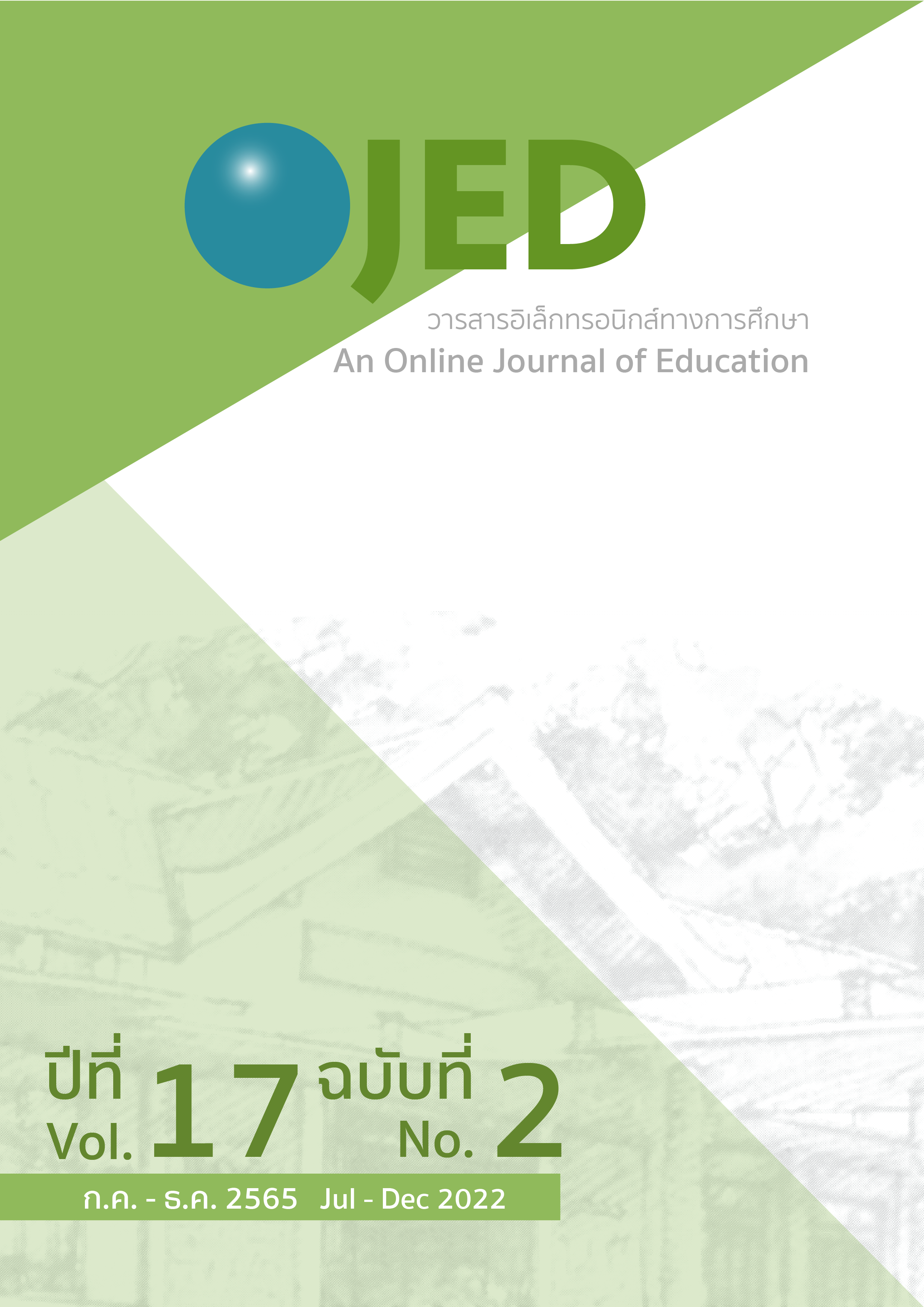Effect of Using Game-Based Inquiry Learning Instruction on Scientific Reasoning Ability of Upper Secondary School Students
DOI:
https://doi.org/10.14456/ojed.2022.40Keywords:
scientific reasoning, game-based inquiry learningAbstract
The purposes of this research were 1) to compare students’ scientific reasoning abilities before and after using game-based inquiry learning, and 2) to investigate their scientific reasoning abilities while employing game-based inquiry learning. The participants in this study were 40 students studying in Matthayomsuksa 4 at the extra-large secondary school under the Secondary Educational Service Area Office Singburi, Angthong. The instruments used in this study were a scientific reasoning ability test, informal interviews, learning logs, lesson plans, and educational games. The data were analyzed using mean, standard deviation, t-test, and content analysis. The findings showed that 1) the scientific reasoning ability of the students was higher after being taught using game-based inquiry learning than before at the .05 level of significance, and 2) after employing game-based inquiry learning, the students showed improvement in the following categories: 1) determination and use of evidence at 24.80, 2) prediction at 20.48, 3) connecting relationships between evidence and conclusions at 28.03, and 4) making conclusions at 28.67.
References
ณรงค์ชัย พงษ์ธะนะ. (2559). ผลของการจัดการเรียนการสอนแบบโต้แย้งและประเมินที่มีต่อความสามารถในการให้เหตุผลเชิงวิทยาศาสตร์และผลสัมฤทธิ์ทางการเรียนชีววิทยาของนักเรียนชั้นมัธยมศึกษาตอนปลาย [วิทยานิพนธ์ปริญญามหาบัณฑิต ไม่ได้ตีพิมพ์]. จุฬาลงกรณ์มหาวิทยาลัย.
พิมพ์พันธ์ เดชะคุปต์. (2544). การเรียนการสอนที่เน้นผู้เรียนเป็นสำคัญ: แนวคิด วิธีและเทคนิคการสอน 1. เดอะมาสเตอร์กรุ๊ฟแมนเนจเม้นท์.
ลฎาภา สุทธกุล และ ลือชา ลดาชาติ. (2556). การให้เหตุผลทางวิทยาศาสตร์ของนักเรียนชั้นประถมศึกษาปีที่ 4. วารสารมหาวิทยาลัยนเรศวร, 21(3), 107-123.
Benford, R., & Lawson, A. E. (2001). Relationships between effective inquiry use and the development of scientific reasoning skills in college biology labs. https://eric.ed.gov/?id=ED456157
Chang, Y. H., & Lin, B. S. (2012). A ubiquitous system supporting game-based Inquiry learning. International Journal of Mobile Communications, 10(2), 190-212. https://doi.org/10.1504/IJMC.2012.045673
Chee, Y. S., & Tan, K. C. D. (2012). Becoming chemists through game-based inquiry learning: The case of legends of alkhimia. Electronic Journal of e-Learning, 10(2), 185-198.
Chinn, C. A., & Malhotra, B. A. (2002). Epistemologically authentic inquiry in schools: A theoretical framework for evaluating inquiry tasks. Science Education 86(2), 175-218. https://doi.org/10.1002/sce.10001
Fitzgerald, M., Danaia, L., & McKinnon, D. H. (2019). Barriers inhibiting inquiry-based science teaching and potential solutions: perceptions of positively inclined early adopters. Science Education, 49(2), 543-566. https://doi.org/10.1007/s11165-017-9623-5
Goodwin, M., Kramer, C., & Cashmore, A. (2012). The ‘ethics committee': A practical approach to introducing bioethics and ethical thinking. Journal of Biological Education, 46(3), 188-192. https://doi:10.1080/00219266.2012.688846
Herranen, J., & Aksela, M. (2019). Student-question-based inquiry in science education. Science Education, 55(1), 1-36.
Downloads
Published
How to Cite
Issue
Section
License
Copyright (c) 2022 An Online Journal of Education

This work is licensed under a Creative Commons Attribution-NonCommercial-NoDerivatives 4.0 International License.




